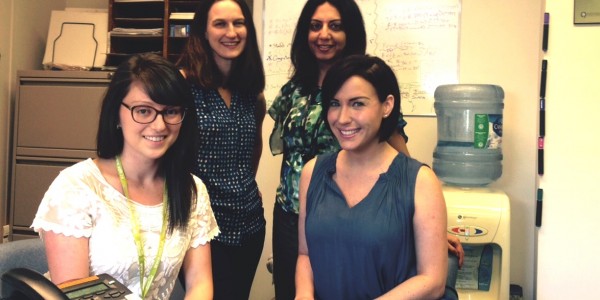Daily bed calls: “It has strengthened relationships and streamlined our process”
A group of mental health and substance use care management leaders convene in an office in the Health Centre at 715 West 12th. They’ve gathered for their daily bed capacity teleconference with various Vancouver Acute and Community teams, including bed coordinators, social workers, program managers and clinical supervisors. The calls only last 15 minutes and are quick and efficient.
“Ok, so JB is waiting for a Venture bed…She’s ALC (Alternate level of care)”
“Venture won’t have any beds until September 4…”
“We are going over capacity. Any options Sarah?”
“We are thinking Shaughnessy Village…”
“She’s ready to discharge in 40 hours. Let’s find out what their capacity looks like…”
“Ok”
The daily bed capacity calls only began this year and yet because of this simple, collaborative process, patient flow has improved. Patients are being discharged from hospital and moving into community housing more quickly and efficiently. These calls have also created a seismic shift in culture that has increased trust, cooperation and teamwork between acute and community staff.
“It has strengthened relationships and streamlined our process,” says Kathryn Embacher, patient services manager, and one of the facilitators for the daily calls.
How did these calls come about?
In 2014, a working group convened to address patient flow issues. Acute beds were reaching over capacity and patients were left waiting in hospital while bed coordinators were frantically looking for more space.
“At one point we were turning meeting rooms into patient rooms,” says Bonnie Wilson, director of home and community care & supported housing. “Things had to change, and in order to do that, we needed to increase dialogue between the inpatient team and the community team.”
Before the daily calls, communications between housing and acute was sporadic and fragmented. “It could take weeks or even months to transfer patients because we would be trying to call A, then B, then C, then D,” said Monica McAlduff, director of mental health and addictions. “Once we began daily calls last January, we were bringing key stakeholders together, learning what are available, what’s not, and sharing resources and problem solving.”
At first, Wilson and McAlduff admit staff were sceptical of the daily calls and concerned it would take up too much time. “However, we focused on being positive and keeping to schedule, and quickly these calls became productive and collaborative.”
Each phone call is no longer than 15 minutes and, as the patients are discussed, the progress is tracked on a spreadsheet that is then distributed to each call participant and utilized for the next call the following day.
Patients receive faster, better care
Since the calls began, the average length of stay has decreased, transfer delays have decreased, and the rate of discharge has increased.
“At first we were unsure what to bring forward. But now we have specific asks and collaborative discharge planning,” says Leah Reynolds, registered psychiatric nurse.
The calls have been so successful that Providence Health is now participating in them as well.
“Staff on both sides now understand the system more,” says Wilson. “We’re becoming more accountable, responsible and efficient. And ultimately, the patient receives faster and better care.”

